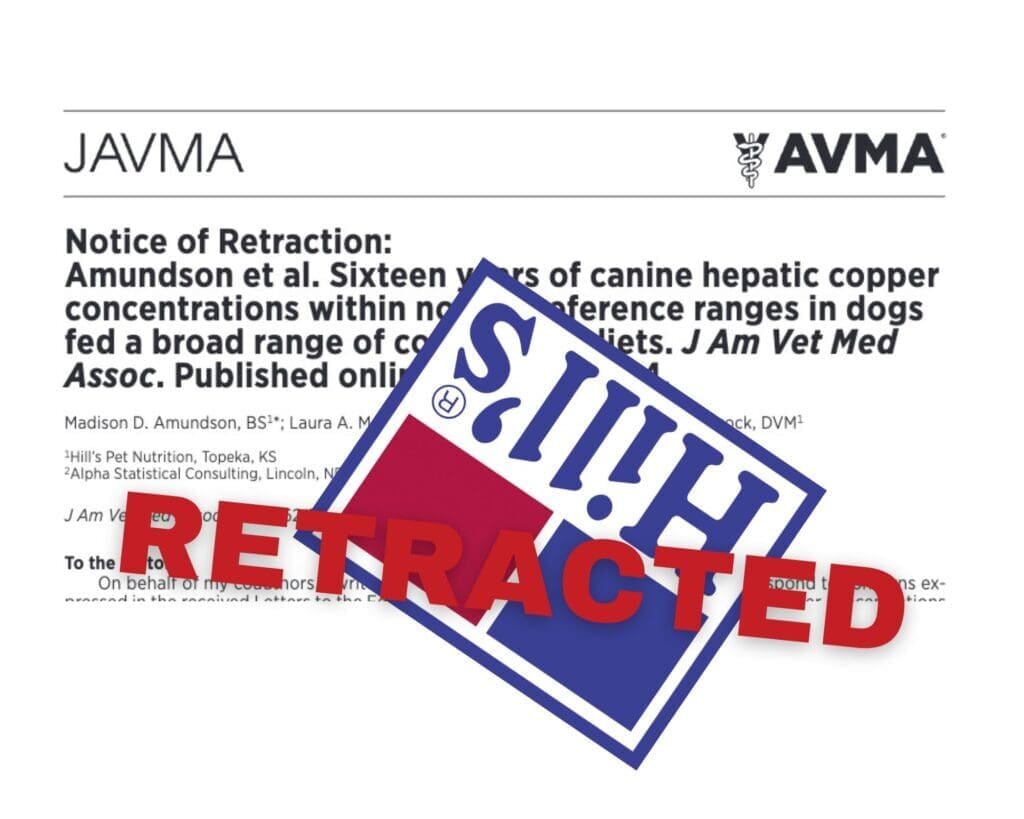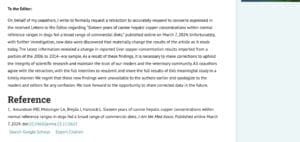Controversy Engulfs Vet Journal JAVMA:
Top Vet Experts Say Now Retracted Article Was Industry Attempt To Silence Alarms About Excess Copper in Commercial Dog Food. Vets Say Letters To Editor Lambasting Article, Causing The Retraction, Have Been Muzzled.
For the first time since its founding in 1863, according to its editor, the Journal of the American Veterinary Medical Association (JAVMA) has retracted an article. The topic: commercial dog diets and the connection, if any, to canine liver disease (copper associated hepatopathy). The now retracted paper, entitled “Sixteen years of canine hepatic copper concentrations within normal reference ranges in dogs fed a broad range of commercial diets,” which came online March 7, 2024, was authored by three employees of pet food giant Hill’s, including the company’s chief medical officer, Leslie Hancock. The article has now been excoriated by leading veterinary experts on the subject who wrote letters to the editor detailing numerous, significant errors. JAVMA retracted the article, but is so far refusing to publish the letters to the editor disputing the article and causing the retraction.
The Dog Food – Dog Liver Disease Debate Now Raging
Last August, TCR published a report highlighting the work of Cornell’s Dr. Sharon A. Center, one of the world’s leading veterinary experts in small animal liver disease. The number of dogs now at risk for fatal liver diseases has skyrocketed over the past decade and the culprit is excess levels of copper in commercial dog diets. That’s what the world’s authorities on dog liver diseases, including Dr. Center, told The Canine Review in a series of interviews last summer.
Dr. Center and colleagues began sounding the alarm more loudly in recent years — ironically, one of the most discussed publications is probably the commentary Dr. Center and her colleagues published in JAVMA in February 2021, “Is it time to reconsider current guidelines for copper content in commercial dog foods?” Many of the authors of that 2021 JAVMA commentary were also authors of the still unpublished JAVMA letters to the editor.
“Dogs will continue to die.”
That recommendation failed, but not without protest. Dr. Center did not attend the Pet Food Committee meeting, she later told TCR, but her colleague Dr. Cynthia Leveille-Webster, a veterinary internist at Tufts, did. (The Canine Review also attended the meeting virtually.)
“I hear a lot about working collaboratively to get the necessary information to formulate a scientifically based decision,” Dr. Leveille-Webster wrote in the chat of AAFCO’s webinar. “We need to start putting the health of dogs first and foremost,” she added, “as this is not a problem only of genetically predisposed dogs. And dogs will continue to die from copper associated hepatopathy.”
The Retraction
The retraction came after several veterinary experts in canine liver disease, including Cornell’s Sharon Center, lambasted the article in letters to the editor. (based on the letter we were able to review and on Dr. Center’s account) – letters which JAVMA, the American Veterinary Medical Association’s flagship journal, has so far refused to publish.
Now, those expert veterinarians are speaking out. In an interview this week, Dr. Center told TCR her 4,000-word letter to the editor detailing the paper’s errors had been effectively disappeared, even asking TCR to attempt to obtain it from JAVMA editor Dr. Lisa Fortier.
More surprising, Dr. Fortier of JAVMA seemed to try to block anyone from reading the as-yet unpublished letters. She made a copyright claim in writing to TCR when we asked about the unpublished letters and why Dr. Center said she believed she would not be at liberty to provide her letter to TCR for publication without risking legal exposure.
“The AVMA owning copyright of the Letter to the Editor does not preclude authors from writing about the same or similar subjects,” Dr. Fortier told TCR in an email. “Copyright does not protect ideas, concepts, systems or method of doing something, just the specific way the ideas and concepts are expressed.”
In repeated follow-ups and requests for clarification with Dr. Fortier regarding the copyright claim with the AVMA executive leadership copied on the emails, Dr. Fortier did not go further.
The full email exchange with JAVMA can be read here.
Other veterinary experts spoke earlier with RetractionWatch, which tracks retractions issued by scientific journals. According to the RW story, the AVMA approached RW ahead of the retraction in an apparent attempt to preempt and head off, well, this. RW’s Ellie Kincaid, the reporter who wrote the earlier story, could not be reached.
“We were very troubled after reading the recent publication,” veterinary internists Cynthia Leveille-Webster, David C. Twedt, and Keith P. Richter wrote in a co-authored Letter to the Editor first provided to RW.
“The statistical approach of the data is naïve and incorrect…. The hepatic copper quantitation methodology appears flawed,” the vets continue. “We find their summary and conclusions to be incorrect and misleading. It is obvious to us the authors have little if any knowledge of copper associated hepatopathies and hepatic copper metabolism.”
A Bogus Retraction Note
Even JAVMA’s retraction note seems misleading at best. There is no accounting for or even mention of the numerous, substantive errors and gross oversights detailed in the letters to the editor, which JAVMA is refusing to publish according to Dr. Center. The note attributes the retraction to “new data.”
The retraction was published in the form of a link in the JAVMA paper which contains this statement from co-author Madison Admundson:
On behalf of my coauthors, I write to formally request a retraction to accurately respond to concerns expressed in the received Letters to the Editor regarding “Sixteen years of canine hepatic copper concentrations within normal reference ranges in dogs fed a broad range of commercial diets,” published online on March 7, 2024. Unfortunately, with further investigation, new data were discovered that materially change the results of the article as it reads today. The latest information revealed a change in reported liver copper concentration results imported from a portion of the 2006 to 2014–era sample. As a result of these findings, it is necessary to make corrections to uphold the integrity of scientific research and maintain the trust of our readers and the veterinary community. All coauthors agree with the retraction, with the full intention to resubmit and share the full results of this meaningful study in a timely manner. We regret that these new findings were unavailable to the authors earlier and apologize to the readers and editors for any confusion. We look forward to the opportunity to share corrected data in the future.
As noted, Dr. Center declined to provide what she told TCR is a 4,000-word Letter to the Editor for publication because, she says, she believes she could face legal exposure in the face of JAVMA’s claim that it owns a copyright to her letter.
Journalists are ethically obligated to avoid providing legal advice to sources and story subjects because they should not be perceived as advocates, but TCR did press JAVMA on the matter of the copyright claim and how Dr. Center could have been under the impression that she was not at liberty to disseminate the letter.
Nonetheless, three other vet experts — Cynthia Leveille-Webster, David C. Twedt, and Keith P. Richter were apparently undeterred by the AVMA copyright claims. Here’s an excerpt from what they published in addition to the original AVMA letter in Retraction Watch:
“We believe the real underlying objective was to prove that commercial dog foods are not responsible [for the uptick in dog liver disease].”
“The decisions surrounding this retraction were made to assure to the best of our ability that AVMA publications are scientifically accurate,” Dr. Fortier told TCR in a statement. She added that, “retraction guidelines from the Committee on Publication Ethics and The National Information Standards Organization were followed.”
In an especially confusing line of Dr. Fortier’s statement to TCR, she wrote: “The process was successful,” she said, “in that the Letters to the Editor were evaluated by the authors of the article, which resulted in their discovery of new data that changed the results of the article. Because the data were new and changed the results of the article, it was too much for a correction, which ultimately led the authors to request a retraction of their article. JAVMA proceeded with publishing the retraction as quickly as possible following publishing industry standards and contemporary editorial practices.”
She added: “In our review process, the reviewers can see who the authors are, where they work, and any potential conflicts of interests, all of which are clearly disclosed.”
But the authors of the letters to the editor disagree with Dr. Fortier’s account and say they continue to be surprised by the journal’s decision to decline to publish the letters.
As this story was going to press, Dr. Fortier reached out to TCR and requested that we hold our story through the weekend, until Monday.
“Please hold until Monday. As I said, I am working with the authors of the letters.”
Dr. Center declined to comment further, so it’s unclear what exactly is now being discussed or debated between the authors of the letters and the Journal.
“I am collaborating with all the authors of the letters with a common goal of ensuring scientific accuracy of our literature for our profession and our patients. I will be back in touch once we have a resolution,” Dr. Fortier added.
Related


